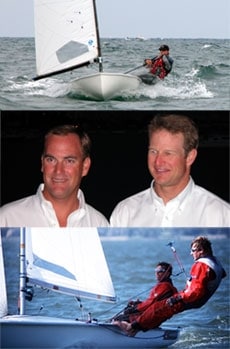
Olympic Int Pt 2
Over the past five Olympic Games, the U.S. Sailing Team has performed well, earning 27 medals out of 46 classes. This impressive performance will be tested in Athens. Competition is getting tougher. In fact, parity is the trend. For example, in Sydney in 2000, 16 countries shared 33 medals. And in Savannah in 1996, a record 23 countries earned medals. Still, in Athens, America’s chances are encouraging. The U.S. sailors have been working hard preparing for the Games. While all were definitive winners in their respective classes in the U.S. Trials, they’ve realized that qualifying was just the start of their preparation. I had a chance to interview each sailor and found their attitude to be very determined. Here are their thoughts. EUROPE: Meg Gaillard, 30 What training are you doing to prepare for the Games? It’s important to keep my racing skills high, so I’m sailing as many regattas as I can before the Games. Were the trials helpful in your preparation for the Games? It was an excellent exercise in getting my equipment ready. Sailing is always a mental game as well. It’s tough not to think about the end result and focus on the task at hand. What are your prospects for a medal? I think my prospects are excellent. I was third at the Worlds last year in Cadiz. 470 MEN: Paul Foerster, 40 How helpful is your experience from past Olympics as you prepare for Athens? There are a lot of things out of my control; anything can happen in a regatta. That’s all the Olympics are, when you come right down to it. Is it hard working with a new crew? It is always hard working with a new crew. I haven’t had the same crew for any of my four Olympics campaigns. What are your prospects for a medal? We are just trying to give ourselves the best possible chance at the Olympics. 470 MEN: Kevin Burnham, 47 Do you ever wear shoes when you’re sailing? No. How is it working with a new skipper? Awesome. Paul is one of America’s best helmsmen and should be an America’s Cup driver. How helpful is your previous experience at the Games as you prepare for Athens? With all of our combined experience I am comfortable in our ability to reach the top of the podium. We are our toughest competitor. Does it get easier with time? I have close to thirty years of experience in the 470 class and still feel great! STAR: Paul Cayard, 45 Did your Cup experience as a manager and skipper help in the Star? Yes. In participating in five America’s Cups I have learned how to plan and prepare a campaign to win races. The attention to detail that one goes through for an America’s Cup campaign is very high. Is the fact that you were an alternate in 1984 helpful? I have been through the processing and the Opening Ceremony. However, I have never competed in the Olympics. Hopefully the other big races I have been in will make me feel comfortable in Athens. Was it a difficult transition going back to small boats? When you sail big boats with large lumps of lead hanging off them, you lose your sensitivity. I am fast upwind but slow downwind. This is because I have lost my feel. I am working hard to regain it. What are your prospects for a medal? The Star fleet is extremely tough and this time will be no exception. But Athens is a tricky venue, so plenty of opportunity if one’s head is in the game. STAR: Phil Trinter, 35 How physically demanding is it to crew on a Star? In a breeze you have to throw your body about quite a bit. What’s your role tactically? If we are not in the groove, Paul has to focus on setup and try to find more speed. When this happens, my roll tactically grows to where I get to make a few of the tough decisions. How was it going back to the Star from the America’s Cup? It was time for a new challenge. Going back to the Star to do an Olympic campaign was a natural. TORNADO: John Lovell, 36 How will your past Olympic experience help? Having been to the Games twice will be a big plus for our team. How long have you and Charlie have been together? Charlie and I have been sailing together since 1993. We are great friends on and off the water. Do you think you can break through and earn a medal this time? We have a great shot at winning a gold medal. During our campaign we focused on the Olympics, not the Trials. We just got back from Europe where we placed second at the Worlds. How is the Tornado with the spinnaker? The spinnaker has added a new dimension to the boat. It is very similar to a skiff, boathandling and downwind tactics are much more challenging. TORNADO: Charlie Ogletree, 36 Is racing together becoming second nature? In 11 years of racing together we have seen almost every situation and faced many problems. This is part of our strength. We do not get angry anymore. We have learned to be patient. Racing together today is more enjoyable than ever. Do you enjoy sailing with the new spinnaker? The speed is incredible, even scary at times. It has forced me to be in the best shape of my life. Part I of Jobson’s interview featuring the 49er, Yngling, and Finn classes, can be found here. Part III of Jobson’s interview, including quotes from the U.S. representatives in the Laser, 470 Women’s, and Mistral classes, will be posted on August 9.









